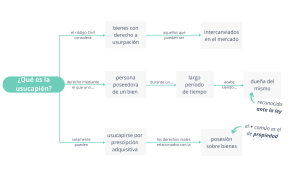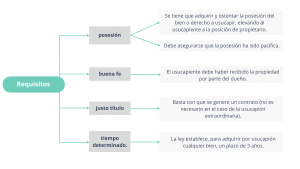The protagonist word of today’s post is, possibly, one of the strangest we have dealt with so far in this blog: usucapion. It seems, instead of a legal term, a medical one. But we can assure you that this is a real term that our team uses on a daily basis. And it has a synonym: acquisitive prescription. Perhaps with these 2 words we can draw some conclusion about the meaning of usucapion. Anyway, we are going to explain everything step by step so that you know exactly what this strange term means and in which situations it is applied. Here we go!
The meaning of usucapion
Usucaption or acquisitive prescription is a legal mechanism through which a person can acquire the right of ownership and other real rights by the fact of having possessed them for a period of time. Real rights, in case you are not aware of this type of right, are those that allow the holder to have power and obtain economic advantages of a thing against other people. This means that all other individuals would be prohibited from using and enjoying that which is disputed. A real right, therefore, deals with relationships between persons and property. The Civil Code considers goods entitled to usucaption as those that can be exchanged in the market.
In short, usucaption means that a person who has owned a property for a long period of time becomes its owner, recognized before the law. The property right is not the only one that usucaption can cover; it is the most frequent, but it is not alone. Any other right in rem involving possession over things would be under the umbrella of acquisitive prescription. For this to be effective, it is only necessary that the person in possession of the property has had it for the time established by law.
This legal mechanism serves to respond to the reality of that property for reasons of legal certainty. A person is granted ownership of the right for having exercised it for a long time. Normally another cause is usually the laziness of the original owner, who, not having exercised his right, has left it and allows the law to update the ownership situation, adapting it to the reality of the fact. It is important to note that the person entitled to usucaption may use it at a later date, without being obliged to do so immediately.
The Civil Code provides for usucaption, both by the person who has possessed the property for the period of time established by the law and by his heirs and successors in title if he should die. If a person who holds the same right as holder dies before the time limit for usucaption, the heir or successor in title may take advantage of the years of possession that have elapsed to add them to his possession. Thus, it should wait to complete the remaining years until consummation. This would be the case as long as the successor initiated the possession before 1 year had passed since the death and continued it in the same possessory concept of his successor in title.
What rights are usucaptable?
Only real rights related to the possession of goods can be usucapted by acquisitive prescription, the most common being that of ownership. Personal rights, even if their exercise involves a certain material possession over property (as in the case of lease) cannot be acquired by usucaption, since they do not belong to the category of real right.
This exception means that, for example, a tenant who has been living in a rented apartment for 40 years can in no way acquire the right of tenancy or ownership.
Subjective rights expressly excluded by the law itself would not be usucaptable either. In Catalonia this occurs with easements.
In short, not all rights in rem are usucaptable; only those that are related to possession over a thing, as long as the law does not specifically exclude them. Subjective rights that, although real, do not entail possession over things, are not usucaptible either. This would be the case of a mortgage or preemptive acquisition rights. The Catalan legal system, specifically, contemplates a real right such as the census that, although it is not possessory, the law allows it to be acquired by usucaption.
Requirements for usucaption
Usucaption occurs as soon as all the requirements established by law are met, without the usucapient person having to take any steps. Let us see, therefore, what are the conditions for a person to have access to this right:
– Possession. The first thing that is necessary for the acquisitive prescription to take place is the acquisition and possession of the property or right to be usucapied (normally it will be real estate). What usucaption does is to give legal protection to this possession. The usucapient is thus elevated to the position of owner. There are, however, certain conditions: possession must be in the capacity of owner. The time of possession tolerated or authorized by the owner does not count. It must also be public. The purpose of usucaption is that the usucapient is perceived as the true owner. Therefore, the law will eventually recognize it as such.
It must also be ensured that the possession has been peaceful. This clause excludes all cases in which the rights have been claimed by the owner, in addition to those taken violently. A practical example of a non-peaceful case would be the occupation of a property illegally, in which the squatter holds the property with no “apparent external will” to act as owner. Its objective is, apparently, an alternative ideological manifestation to the exclusionary power of property rights.
Possession must also be uninterrupted. Usucaption is a prescriptive modality and can be interrupted through judicial and extrajudicial claims. It can also be done materially (if the property or right is abandoned for more than one year) or by express or tacit recognition of the owner’s right.
– Good faith. It is the belief that the usucapient has received the property from the owner. This means that the person who wants to access the usucaption of a right must do so without a defect in its title that invalidates it. This requirement does not operate in extraordinary usucapion.
– Just title. This title is sufficient to transfer the property or right. It would be sufficient for a contract to be generated (even if affected by causes of annulment). However, a contract vitiated by a cause of nullity is not considered to be just title. This title is not necessary in the case of extraordinary usucapion. If the terms of possession are extended, the usucapient would not need to have any title.
– Time certain. The law establishes a 3-year term to acquire any property by usucaption. In the case of real estate, this period is extended to 10 years for those present and 20 years for those absent. However, some rules must be complied with: the usucapient may compute the time the property was in possession of the deceased. If a person takes possession of a real estate property from someone who has already been in possession of it for 9 years, he would only need to spend 1 more year in that real estate property to acquire it by usucaption. It is presumed that whoever currently owns the asset and owned it at another time has owned it all along. Only by offering evidence to the contrary could it be shown that there was any interruption in possession.
Extraordinary usucaption
Everything we have discussed up to this point refers to ordinary usucapion. But there is another type of acquisitive prescription: the extraordinary one. This modality does not require good faith or fair title, since they do not operate in this type of usucaption. Possessory terms, however, are extended. If these longer terms are complied with, usucaption is possible despite not being the owner of the property in any case and under any valid title.
The disadvantage of this case is that, as we have said, the possession term requested is much more demanding. In the case of personal property, these must be held for at least 6 years; in the case of real estate, possession is extended to at least 30 years.
Whether it is an ordinary or extraordinary usucapion, in the end we have to deal with very complex laws and situations, so it is more than advisable to have legal advice appropriate to the requirements of the case and the client.
For this reason, at Blegal our entire team works side by side and in constant evolution and research to be able to offer all the news and legal services you need today. One of our main goals is to be aware of all the changes occurring in the current legal environment, both national and regional. With this we know that we can offer adequate services to the customer who comes to us with any questions. At Blegal we accompany you at all times, not only when you think you need something, but whenever you do.
For information on related topics visit our page on Types of Corporations.
Photo by Sean Pollock on Unsplash .






